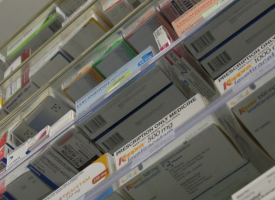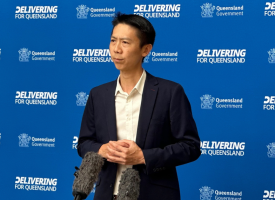Satellite hospitals delaying emergency care
As the services provided by satellite hospitals remain unclear, patients are increasingly presenting to these clinics when they really should be seen by emergency departments, AMA Queensland President Dr Maria Boulton said. "It's causing a lot of confusion, which is why we've called on Queensland Health and the State Government to ensure that they are doing everything possible to educate the community as to where they need to go."

Transcript: AMA Queensland President, Dr Maria Boulton, ABC Radio Brisbane, Drive with Kelly Higgins-Devine, Tuesday 21 May 2024
Subjects: Satellite hospitals
KELLY HIGGINS-DEVINE: If you live around Redlands, Caboolture, Ripley, Tugun, and Kallangur then you may have been to one of the new satellite hospitals that’s opened. We've got another two opening up this year at Eight Mile Plains and Bribie Island, but it seems a lot of people who should be heading straight to hospital emergency departments are turning up to these satellite hospitals instead and putting themselves at risk. Dr Maria Boulton is a GP and President of the Australian Medical Association of Queensland. Maria, hello.
DR MARIA BOULTON: Good afternoon, Kelly.
KELLY HIGGINS-DEVINE: First up, how are the satellite hospitals going? What are you hearing back about whether or not they're actually easing pressure on the emergency departments?
DR MARIA BOULTON: It's really interesting because the newest data shows that the emergency departments are still very busy. When you look at the number of category one and category two presentations presenting to emergency departments, and these are people with heart attacks or strokes, they're actually increasing. So, the pressure on our emergency departments is still there and it has us very concerned. It's putting a lot of pressure on the wonderful paramedics, doctors and nurses that work in those departments.
KELLY HIGGINS-DEVINE: The data is concerning, isn't it? Nearly 1,150 people turning up to one of these satellite hospitals in the first three months of the year, when they should have been going straight to emergency. That's a lot of money and a lot of people.
DR MARIA BOULTON: That's right. When you read about what services are provided in the satellite hospitals and you look at their website, it says that they provide services caring for people with minor injuries and minor illness. The trouble is, like you said, sometimes it's really difficult to know whether what you have is minor or major, and there's a lot of people presenting to these clinics that should instead be presenting to the emergency department. These are people with, for example, chest pain and symptoms of stroke that shouldn't be at the satellite hospital. They should actually be in a proper emergency department. But when you're a member of the public and you don't have a medical degree or a nursing degree or a paramedic degree, it's really difficult to know where you should go. It's causing a lot of confusion, which is why we've called on Queensland Health and the State Government to ensure that they are doing everything possible to educate the community as to where they need to go.
KELLY HIGGINS-DEVINE: They call them satellite hospitals, but on the website they actually use the word clinic – clinic will provide walk in urgent care for illnesses that aren't life-threatening, such as simple fractures. Well, once again, if you've broken your finger, you know that that's going to be a simple fracture, but if it's your arm or something's happened, most of us wouldn't have a clue whether it was simple, complex, or compound, whatever you call it. Is part of the problem that we, and as you've mentioned, don't know what we've got most of the time. If you do, lovely, but then you get there, and you go – no, no, no, something else is happening. It's certainly not a heart attack – because we're all in denial about that. So, you go there, and they go – oh no, you're having a heart attack. So, there you are, you're already an hour to a half down the track on having this heart attack thinking you'd be doing the right thing.
DR MARIA BOULTON: Absolutely, and when it comes to heart attacks and stroke, we know that time is precious. We know that time to treatment is crucial, and any delay can have detrimental effects on your health. The satellite hospitals do provide other services that are by appointment only. I know that some provide dialysis, some provide mental health services, some provide sleep services which are really valuable in those communities so that people don't have to travel to access those. What we're hearing is that when it comes to emergency presentations, the community is confused.
KELLY HIGGINS-DEVINE: I know there's been a $1 million campaign thrown into educating people, but it's obviously not getting through. How do you educate, Maria? Where would you go with this?
DR MARIA BOULTON: It's really difficult. The question that keeps getting asked is should the name be changed away from hospital? The bottom line is that if they're not getting what they need with the current name, then it is something that they're going to need to look at. Because if that's confusing people and, you know, when people think hospitals, they think of somewhere with an emergency department that has beds and it's a 24-hour service, and we know that these satellite hospitals don't provide that. So, I guess it's to talk to the members of the public ask them, what do you need?
Sometimes we have to accept the fact that people will turn up to the wrong place, and that's fine, as long as they're somewhere where there's a healthcare professional that can point them in the right direction. It's better than nothing. With all these minor illnesses and injuries, that's also what your GP is great at. I know that sometimes access is an issue, particularly as the Medicare rebates that you have in order to access your GP haven't kept up with the cost of providing the service. That's why we keep asking for the Federal Government to do more in that space, to ensure that everyone has access to their GP. Because you know what, there's a GP clinic in most areas in Queensland.
KELLY HIGGINS-DEVINE: Maybe the thing is to rename them from satellite hospitals to satellite clinics, because that would automatically tell me – okay, this isn't a hospital as such, it's a place where I can get treatment for basic things. You can then promote the other things that are available once you're in there, but it I think that language would maybe solve a few of the problems anyway.
DR MARIA BOULTON: Perhaps, and that's research that they need to do. Like with everything, when you name something, you need to ensure that, you know, my clinic is very simple, and people see the name they know what sort of services we provide. It needs to be crystal clear so that when you're driving past and I drive past the Bribie Satellite Hospital construction area fairly frequently, I can see this is what this does just from the name.
KELLY HIGGINS-DEVINE: All right, Dr Maria Boulton, thank you very much. Let's hope we get just a bit of clarification from the government on the naming of these satellite hospitals. Maybe that will help with confusion. We'll see what they come up with.
I've got a text here that says – I've been to Caboolture Satellite Hospital three times. Once for a dislocated shoulder, two times for oral health. Can't speak highly enough of them. So that's good to hear.
DR MARIA BOULTON: That's great to hear, and it's got to do with the brilliant job that the doctors, nurses and receptionists at every facility is doing. We know that everyone's under the pump at the moment and where would we be without them.
KELLY HIGGINS-DEVINE: Exactly. Thank you, Dr Maria Boulton, and Dr Boulton is President of AMA Queensland.



